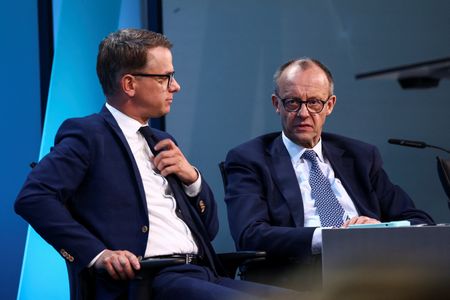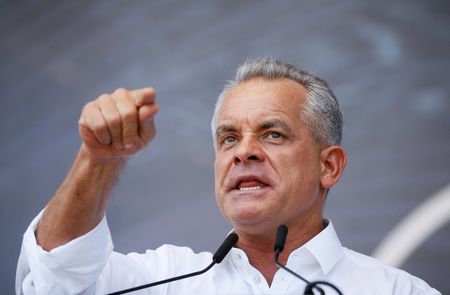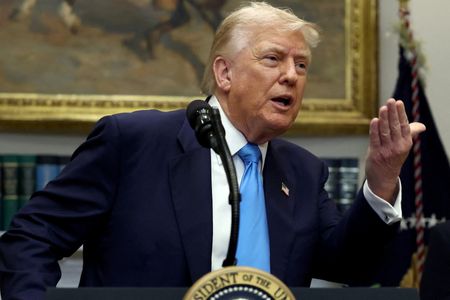By Andreas Rinke and Sarah Marsh
BERLIN (Reuters) -Germany’s Chancellor-in-waiting Friedrich Merz on Monday named utility executive Katherina Reiche as his likely economy minister and ally Johann Wadephul as foreign minister, as part of a raft of first appointments.
Merz’s CDU/CSU conservatives, who topped February’s elections, clinched a coalition deal with the centre-left Social Democrats (SPD) earlier this month as they race to form a new government to deal with an array of international crises.
The two parties aim to revive growth in Europe’s largest economy just as a global trade war sparked by U.S. President Donald Trump’s sweeping import tariffs threatens another recession year, as well as to ramp up defence spending amid strains in the transatlantic NATO alliance.
“We will propose to the United States of America that it would be best if we go to zero for all customs duties in the exchange of goods,” Merz told a meeting of his conservatives after announcing his cabinet picks.
Merz hopes his government will avoid the infighting that plagued the three-party coalition of his Social Democrat predecessor Olaf Scholz, which collapsed last November, and prove more decisive.
Merz and the SPD have already managed to push a historic fiscal package through parliament that will enable his government to drastically boost spending on infrastructure and defence.
The coalition deal accorded Merz’s Christian Democrats (CDU) the economy and foreign ministries, their Bavarian sister party the Christian Social Union (CSU) the interior ministry and the SPD the defence and finance ministries.
Germany’s most popular politician Boris Pistorius is widely expected to remain defence minister, while many bet on SPD party chief Lars Klingbeil becoming finance minister.
ECONOMY PLANS
The new coalition’s plans include cutting taxes for middle and lower income Germans, reducing a corporate tax, lowering energy prices and supporting the electric car industry.
The nomination of the CSU’s Alexander Dobrindt as interior minister indicates a tougher stance on migration, as the coalition seeks to reduce support for the far-right Alternative for Germany (AfD), which has topped some polls in recent weeks.
The coalition has also vowed strong support for Ukraine and higher military spending as Europe faces a more hostile Russia.
Reiche, 51, a former lawmaker and CEO of regional energy infrastructure firm Westenergie, replaces Robert Habeck of the Greens. Various industry associations praised Reiche on Monday as a competent manager with solid practical experience.
Greens party co-chief Felix Banaszak said Reiche’s nomination could presage the return of fossil fuels at the cost of transitioning to green energy.
Wadephul, deputy leader of the CDU/CSU faction in parliament responsible for foreign and defence issues, will succeed Annalena Baerbock of the Greens as foreign minister.
While Baerbock had often dissented on the foreign policy favoured by Scholz, analysts said there could now be greater clarity that Germany’s allies will appreciate as the CDU will hold both the chancellery and the foreign ministry.
“Merz has created the conditions and structures to be a very strong chancellor in foreign policy,” said Jana Puglierin, head of the Berlin office of the European Council on Foreign Relations think-tank. “He will be responsible for relations with the United States, China and Russia.”
Reflecting the realisation Germany needs to improve the digitalisation of its economy, Merz’s coalition has created a new ministry for digitalisation to be headed by business executive Karsten Wildberger.
“The establishment of the new department is a milestone for Germany,” said Ralf Wintergerst, head of German digital association Bitkom.
The SPD will name its ministers next Monday, after party members have approved the coalition deal in a vote, party chief Klingbeil has said, according to two party sources.
Merz is expected to be sworn into office on May 6.
(Reporting by Andreas Rinke and Sarah Marsh; Additional Reporting by Rene Wagner, Alexander Huebner, Friedrike Heine and Matthias Inverardi; Editing by Gareth Jones and Mark Heinrich)












